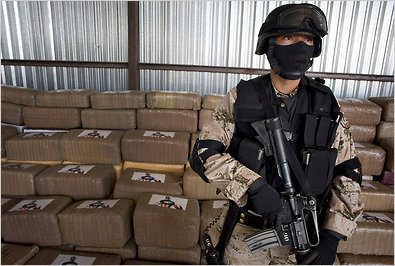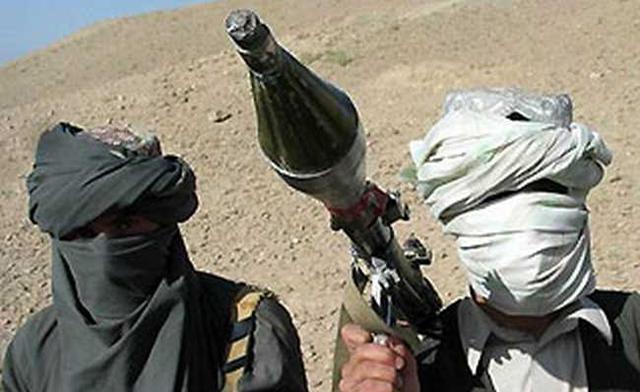For the past six years, Mexico has been engaged in semi-open warfare with drug cartels. Due to its proximity to the world’s largest drug market (the United States and Canada), Mexico has become a transportation centre for cartels looking to ship drugs originating from various parts of the world. Representing 3-4% of Mexico’s annual GDP and annual revenues of $30-39 billion, the drug trade is big business in Mexico.
21 Grams
Though the problem of Mexican drug smuggling originated in the 1960s, it has gained major attention since the dissolution of the Colombian drug cartels in the 1990s. The void left by these organizations was quickly filled by Mexican organizations like the Sinaloa and Gulf Cartels.
Mexican drug cartels now dominate the whole-sale illegal drug market, with the most prominent of these drugs being marijuana and cocaine. US authorities estimate that 90% of the cocaine entering the United States comes from Mexico. Mexico is also the main supplier of methamphetamines and cannabis to the United States, as well a major supplier of heroin.
In 2006, President Vincente Fox ordered Operation Michoacán in order to combat the cartels. This marked the beginning of direct military intervention to deal with Mexico’s drug problem, and marked the official start of the Mexican drug war. Drug cartels operate like military outfits and are able to match the military in terms of equipment and personnel. In fact, one of the most prominent cartels, Los Zetas, was founded by former Mexican army and Special Forces personnel who left the military for higher salaries in organized crime.
The violence has been horrific, in large part due to the militarization of the drug war. Atrocities are carried out to send very public messages to the authorities, exemplified by an incident in 2011 in which 35 bodies were left hanging from a freeway. 62 people lost their lives in 2006 as a result of drug-related violence; in 2007 this number had exploded to 2,837. Since 2006, over 70,000 people have perished. A further 1.6 million people have been displaced because of the conflict. The Mexican Attorney General’s office has claimed that 9 of 10 victims of the Mexican Drug War are members of organized-crime groups. Outlets have criticized this number as fallacious as the Mexican government is trying to downplay the number of civilian deaths, including children, due to the drug war.
The Mexican drug war is a problem north of the border. Mexican drug cartels are financed primarily through American money. Echoing a report from the US Justice Department, Janet Napolitano testified before the Senate, that Mexican drug cartels are the largest threat to the United States in terms of organized crime. But while the Americans remain gravely concerned about spillover violence from Mexico a study released by the Washington Office on Latin America found that Mexico’s drug war is, for the most part, not spilling over the border to the US. The four American border states with Mexico, California, Texas, Arizona and New Mexico, actually suffer from less violent crime than the U.S. average according to the study.
Walk the Line
Drug trafficking has been shown by the UNODC to be linked with government corruption. This is the case in Mexico. The majority of murders perpetrated by the Mexican drug cartels have intentionally been left unsolved by police. In 2005, nearly 1500 of the 7000 agents in the Mexican federal investigation agency were scrutinized for connections to Mexican drug cartels. Two years later, then President Calderon fired 264 police commanders across the country for corruption. It is common for government officials to give government protection to drug cartel members in exchange for substantial bribes. Drug cartels set up networks that encompass local, state and federal officials to run their networks as smoothly as possible.
Corruption in the legislative and judiciary branches of government also contributes to the deterioration of Mexico’s human rights. The judiciary is plagued by dictatorial judges with little transparency. This has led to problems such as the police and military forces torturing people across the country, often to extract forced confessions. The judiciary has proven to be ineffective in prosecuting these allegations. Currently, Mexico’s torture legislation is not up to United Nations standard. Other charges include the fabrication of evidence, secret detentions, illegal arrests, rape and extrajudicial execution.
The Mexican government has had only small success in curtailing cartel operations. Some cartels, such as the La Familia Michoacana and the Beltrán Leyva Cartel have disbanded. In 2009, the Mexican government released a list of the 37 most dangerous drug lords. 26 of the drug lords on the list have since been captured or killed. Despite this, new leaders have risen to take the places of those captured and new cartels have formed to fill the void left by those who have disbanded.
Mexico’s future remains unclear. The election of President Enrique Peña Nieto has marked a change of course for Mexico’s drug policies. President Nieto’s policies have focused on lowering the murder rate, particularly among civilians, associated with the drug war. This is contrasted with Calderon’s policies of targeting the higher echelon of cartel leaders in order to cripple their operations. The result of Nieto’s policies, with a focus on being proactive instead of reactive, remains to be seen.
Nieto’s policies must also tackle corruption. Civilians must be able to trust the authorities, and the authorities need the support of the civilians if they are to make lasting progress. The cartels often employ the police to act as gunmen and prevent the capture of their leaders, leaving civilians as distrustful of the authorities as they are of the cartels.
With all of these problems facing Mexico, it is no surprise that many are cynical about Mexico’s future. Given that the policies of Fox and Calderon have only lead to higher murder rates, one can only hope that the change in policies will improve Mexico’s fortunes. Between the drug cartels and government forces, for ordinary Mexicans, progress can’t come fast enough.




